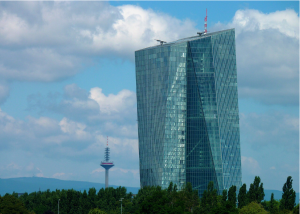The impact of the Covid 19 Pandemic on the EU economy
An article by Kasra Mohammadzadeh

The COVID-19 pandemic has had a profound impact on the European Union (EU) economy. These dual shocks have disrupted the economic recovery and raised significant concerns about the future. This article delves into the repercussions of these crises, analyzes their effects on the EU member states, and explores the challenges that lie ahead for the region.
The COVID-19 Pandemic and its Uneven Impact
The COVID-19 pandemic triggered an unprecedented peacetime recession in the EU, reversing the progress made in rising living standards. In 2020, the EU’s economic output contracted by 6.1 percent, affecting all member states to varying degrees. While some countries experienced severe economic downturns, others were relatively less affected.
The impact of the pandemic on the EU economy was multifaceted.
Moreover, extended lockdowns in China and monetary policy tightening in several countries, particularly the United States, had global repercussions, further impacting the EU’s economic stability.
Economic Outlook and Challenges for EU Member States
Despite the setbacks caused by the pandemic and the war, there are glimmers of hope for the EU’s economic recovery. In 2021, most EU member economies experienced robust growth, with many reaching pre-pandemic levels. EU27 economic growth surged to 5.3 percent in 2021, marking the strongest post-recession recovery to date, after contracting by 5.9 percent in 2020.
Consumer Spending: A Bumpy Road to Recovery
The pandemic had a profound impact on consumer spending across Europe. During the first lockdown in April 2020, spending dropped between 50% and 60% in Germany, France, Italy, and Spain. However, as the year progressed, we witnessed a remarkable rebound in consumer spending. Despite the initial setback, spending stabilized and gradually increased in all four markets. Here is what our research has uncovered:
Germany: A Resilient Recovery
Germany, known for its strong economy, experienced a significant decline in consumer spending during the first lockdown. However, as restrictions eased, spending started to recover. By the second lockdown, Germany had reached approximately 85% of its pre-pandemic spending levels, showcasing a remarkable recovery of +42%.
France: A Strong Bounce Back
France witnessed the most substantial jump in spending recovery among the four markets. After a drop of about 50% during the first lockdown, spending surged and reached 80% of pre-pandemic levels between the first and second lockdown, representing a recovery of +60%.
Spain: Desperate for Recovery
Spain faced a challenging economic situation during the pandemic, with spending dropping to 50% below average in the first lockdown. However, as restrictions eased, spending increased and reached 75% of pre-pandemic levels in the second lockdown, indicating a recovery of +50%.
Italy: Steady Progress
Italy, one of the hardest-hit countries by the coronavirus, also witnessed a recovery in consumer spending. After a 50% drop during the first lockdown, spending improved and reached approximately 70% of pre-pandemic levels, representing a recovery of 40%.
Accelerated Trends: Mobile Payments and Work from Home
The pandemic has accelerated certain lifestyle changes and economic trends, which are likely to continue even as the situation improves. Our research at N26 revealed two significant shifts in consumer behavior: increased adoption of mobile payments and a rise in remote work. Here’s what we found:

Mobile Payments: A Hygienic Alternative
Contactless and mobile payments gained popularity as a hygienic alternative to cash. In Spain, the use of mobile payment methods like Apple Pay and Google Pay surged to 79%. France also experienced a significant increase of 74% in mobile payments.
The pandemic forced many individuals and businesses to embrace remote work. As vaccination campaigns progress, remote work is likely to continue playing a significant role in shaping the future of work across Europe.
The Road to Recovery: Optimism and Challenges Ahead
As Europe moves towards economic recovery, there are reasons to be optimistic. Vaccination efforts are underway, and the continent is gradually reopening. However, challenges remain, and policymakers must navigate carefully to ensure a sustainable recovery.
Inflation Management and Fiscal Support Reduction
European economies face two critical policy challenges: managing inflation and reducing fiscal support. While uncertainty surrounds inflation, central bankers have the tools and experience to address it effectively. The withdrawal of emergency fund’s measures presents a more significant challenge, as premature withdrawal risks hindering the recovery.
Conclusion: A More Promising Chapter Ahead
Though the Covid-19 pandemic profoundly impacted Europe’s economy, the region is now on the path to recovery. Consumer spending has rebounded, and savings have increased, providing a glimmer of hope for the future. Accelerated trends, such as mobile payments and remote work, have reshaped consumer behavior. As a mobile bank, N26 is committed to providing innovative solutions that align with these changing trends.
With our contactless Mastercard, real-time push notifications, and unique saving feature, Spaces, we offer a banking experience that is convenient, secure, and adaptable to the evolving needs of our customers. As Europe enters this next chapter, N26 stands ready to support individuals and businesses on their financial journeys. Together, we can build a more resilient and prosperous future.

Kommentare
Hinterlassen Sie ein Kommentar